What Black Homeschooling Parents Want You To Know!
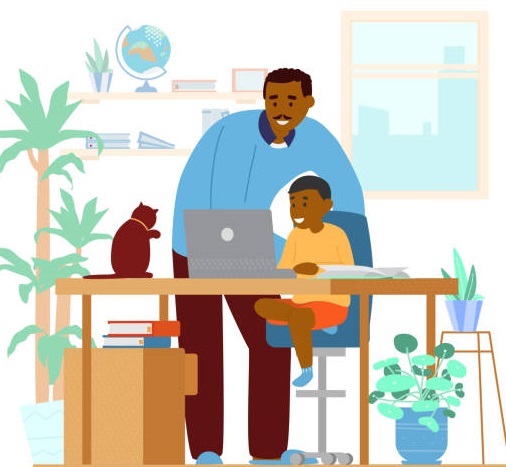
TheAtlantaVoice.com, By Maya Pottiger, Posted September 5th 2022
The rate of Black families homeschooling kids increased by five times in 2020. It was the perfect catalyst to a history of underfunded and under-resourced schools, and new pushes to erase or censor history.
When Jania Otey started researching public schools in 2008 to enroll her son, she was disappointed with her options. She started connecting with people in her church community who were homeschooling, and she and her husband decided to give it a try.
“There are some really good schools out there, I know that,” Otey says. “But in terms of what worked best for our family, we really wanted to be able to guide our children’s education. We were very concerned about the environment that they would be in.”
It worked out. Her oldest son, Caleb, graduated from high school at 16, and he’s set to double major in Bible and computer science at Faulkner University this fall. And, between his high school classes and dual enrollment university courses, he’s one credit shy of being a junior.
From a young age, Caleb showed his academic interests. Otey remembers him “ready to sit down and have school” at only 2 years old. Though homeschooling wasn’t on her radar at that point, it stuck with her.
“Homeschooling is a good way to get ahead because you can design your own schedule a little bit more than you can in public school,” Caleb says. “It’s a good opportunity for kids and parents who want to do the extra work so they can get ahead.”
A Push and Pull Effect
As schools went virtual, everyone — students, parents, educators, lawmakers — scrambled. While Zoom classes were OK for some, others found alternate ways to get an education.
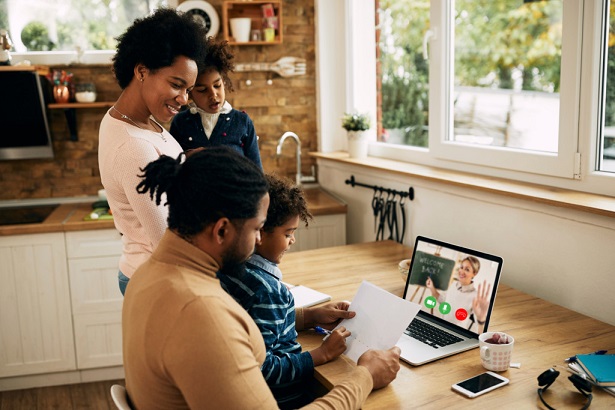
Homeschooling increased across all racial and ethnic groups during the pandemic, but none saw the same dramatic upward trend as Black families — which jumped from 3% in May 2020 to 16% in October 2020.
“While the pandemic served as a likely catalyst for this exodus broadly, it does not explain the disproportionate number of Black households who transitioned to homeschooling models,” Dr. Javaid Siddiqi, president and CEO of The Hunt Institute, wrote in a statement to Word In Black.
While there isn’t a lot of information that points to the change, it’s a push and pull effect of many things happening all at once: majority Black schools are often under-resourced and underfunded; Black students face higher levels of discipline; there are fewer authority figures in the building who look like them; the ongoing debates over critical race theory; and calls for banning books about and by Black people.
These elements “may impact the degree of trust that Black families have in our public education system, which may explain why some Black families are choosing to leave behind traditional schooling methods,” Siddiqi wrote.
However, though homeschooling has steadily been on the rise among Black families, they are still not the most likely to homeschool children. The National Center for Education Statistics’ Condition of Education report found that 5% of Black families homeschool, compared to 6.5% of Hispanic/Latino families and 7.4% of white families.
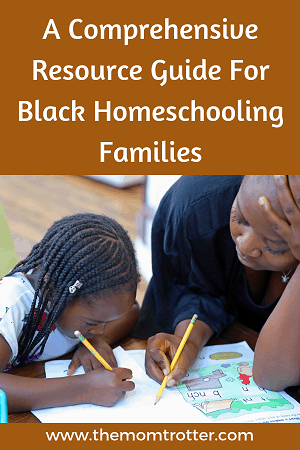
Dr. Cheryl Fields-Smith has been studying homeschooling Black families since 2005. She’s talked to more than 70 families, and the majority have all tried traditional schooling before transitioning to home education. In most cases, the schools they were assigned to go to were “really segregated and underserved.”
Fields-Smith, a professor of elementary education at the University of Georgia, says, “parents spoke about being able to use homeschooling to make sure their child had a more diverse schooling experience, and, at the same time, being able to have greater flexibility in the curriculum, being able to avoid being labeled a troublemaker, getting access to gifted education — all the things that are a challenge in Black education today.”
Being at home with their children during the pandemic was “a huge lesson,” Otey says. It was an opportunity for parents to evaluate their children’s education through a new lens.
“When you are truly the primary teacher, and evaluating your child and seeing what they’re doing on a day-to-day basis, you understand exactly where they are with their core subjects or with their learning,” Otey says of virtual learning. “I think it gave everybody pause, it gave them an opportunity to reevaluate what’s going on in the traditional school setting.”
Erica Reynolds, 19, was also homeschooled her entire K-12 education before enrolling in North Carolina A&T State University. She says a public school environment can be too busy or structured for some students to actually learn and retain information. Contrary to what is common belief, Reynolds did not grow up taking classes in her pajamas. Her lessons were taught in community centers, at museums, and she did science experiments at other families’ homes.
“If you can do homeschooling, you can tailor to your child’s education,” Reynolds says, adding that extracurriculars and group lessons kept her from feeling like she missed out on social aspects. “I was able to interact with other kids even in my classroom.”
Though homeschooling may seem to be “in sharp contrast” to what Black families did to get into public schools through Brown vs. Board of Education, it isn’t. In fact, Field-Smiths’ 2013 study says that the “mere presence of Black homeschoolers in growing numbers challenges the ‘common-sense’ assumption that access to desegregated schools would automatically bring equity to instruction and opportunity.”
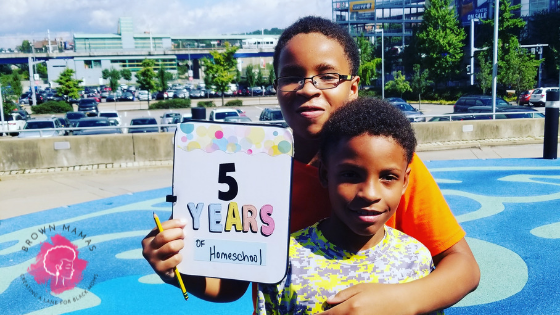
“If you really sit down and read all of our educational history here in this country,” Fields-Smith says, “you’ll see that today’s homeschooling movement among Black people is aligned with our notions of self-determination and self-agency, particularly surrounding getting access to excellence and education for our children.”
Joyce Burges started the National Black Home Educators in 2000 after homeschooling her children in the ’90s. She says Black families didn’t know they could homeschool because they thought it was part of White Flight. But now with everybody telling their homeschooling stories, “it’s just, ‘Hey, let’s do it.’”
“One of the beautiful things about Black families — they love family,” Burges says. Whatever it is they’re doing, they want to include their children and build a legacy. “And that’s what I’m finding now with this young group of people. … Those are some of the reasons that I feel this is gonna last.”
Though she saw interest picking up prior to the pandemic, Fields-Smith never would have predicted what happened. But, she says, it’s important to keep in mind that homeschooling will always be underrepresented in this country because states keep track of home educators differently — some not counting them at all.
“People have to keep watching to see if those levels hold now that schools are opening and all that, are parents choosing to remain in homeschooling or not?” Fields-Smith says. “We’ll know soon, as the numbers keep coming out.”
10 Tips from People Who’ve Been There
Deciding to homeschool your children isn’t a decision that should be made lightly. There’s a lot that goes into homeschooling, so here’s advice from homeschool veterans and a helpful checklist — like Otey’s workshop Homeschool in a Hurry — of things to consider before getting started.
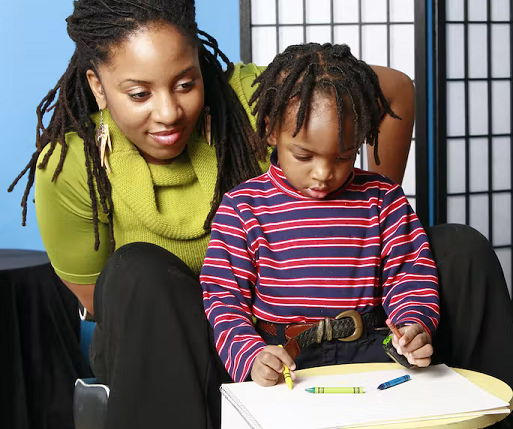
- Check your state laws. There’s paperwork involved, and homeschools still have to abide by state expectations, regulations, and assessments. The Home School Legal Defense Association is a great place to start. “Every state is unique, and you just must know what those laws are,” Fields-Smith says.
- Know your “why.” Homeschooling is a physical and mental shift. Some days will be harder than others. “When you’ve written down your why — why you wanted to homeschool in the first place — you can reflect on that when things get a little difficult,” Otey says.
- Research extracurriculars. In some states, homeschooled students can’t play on sports teams or participate in publicly-funded extracurricular activities. But there are a lot of programs, leagues, and opportunities available.
- Properly transfer out of school. It’s important to ensure you go through all the necessary steps to remove your child from their traditional school, like getting documentation, and requesting your child’s transcripts and records.
- Plan your school schedule. What is your time commitment? Decide if you will do school all day, half days, or continue lessons through the weekend.
- Follow your child’s learning styles. Whether it’s visual, auditory, practical, or a mix, get an understanding of how your child learns best, and that will yield the best outcomes.
- Decide which, if any, subjects will you outsource. Whether it’s Spanish or algebra, there will likely be subjects you might not be strong in. Plan to outsource those lessons, whether it’s through a tutor, online program, or joining another homeschooling group.
- Find or create a support group. Whether it’s for socializations, field trips, sharing curriculum, or mentoring, it’s important to have a network of other homeschooling families. There are also local, regional, and national conventions and conferences for home educators, as well as Facebook groups to join.
- Be flexible. “There’s no one way to homeschool,” Otey says. “What’s important is that your children love the process of learning.” Try new methods, give up on what doesn’t work, plan outings. Reynolds, who grew up in Maryland, recalled trips to DC museums where the artifacts and exhibits reinforce what she was learning.
- Don’t make your house a classroom. If you’re doing school at home, something about traditional schooling didn’t work, Fields-Smith says. “Don’t try to do what teachers have done,” Burges says. “Don’t try to redo the classroom. Homeschooling is a lifestyle.”

